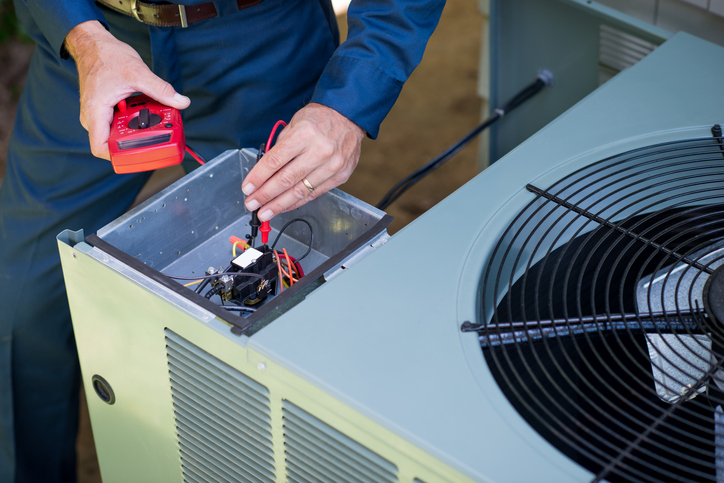
That's why HVAC emergencies are something we need to be prepared for. Whether we like it or not, these problems do arise, and when they do, swift action is the difference between a minor inconvenience and a major disruption. Today we'll serve as your guide, walking you through the crucial steps to take during an HVAC emergency, ensuring you and your loved ones remain comfortable.
Recognizing HVAC Emergency Signs
Knowledge is power. In the world of HVAC, recognizing the early signs of a problem can mean the difference between an easy fix and a major, costly repair. So, what are the signs you need to be on the lookout for?
- Strange Noises: HVAC systems usually operate with a soft hum or a quiet drone. If you start hearing screeching, clanging, or any other unexpected noise, it's time to pay attention.
- Inconsistent Airflow: Does one room feel colder than the others? Inconsistent airflow can be an indication of blockages or a failing component.
- Unusual Odors: If turning on your HVAC system leads to a musty, burnt, or any other strange smell, it’s a potential sign of mold growth or an electrical issue.
- Temperature Discrepancies: If you've set your thermostat to 72°F and after an hour your living room still feels like 80°F, your HVAC might be crying for help.
Understanding these signs and addressing them promptly can make a world of difference.
Immediate Response Steps
When faced with an HVAC emergency, your first instinct might be to panic. But, remember, a calm and strategic approach can prevent further damage and ensure the safety of you and your loved ones.
Safety Comes First: Before anything else, prioritize safety. If you smell gas, shut off the gas supply immediately. In situations where the system is acting erratically or making unusual sounds, it might be best to shut off the power. Also, if there's any indication of a water leak from your HVAC, turn off the water supply.
Reset and Troubleshoot: Many times, minor glitches in the HVAC system can be resolved with a simple reset. Check your system's manual (many are available online if you've misplaced yours) to understand the reset process. Also, look for obvious issues like a tripped circuit breaker, dirty filters, or blocked vents. However, ensure you're comfortable and confident while troubleshooting; if not, it's best to seek professional help.
Determining the Need for Professional Help: Not every HVAC issue requires expert intervention. For example, replacing a clogged filter or resetting a thermostat might be within your purview. However, if the problem persists or if you're unsure of the issue after your initial checks, it's always safer to call in the experts.
Finding the Right Professional Help
Your HVAC system is a crucial component of your home, and you wouldn't want just anyone tinkering with it. Here's how you can ensure you're choosing the right professional:
Research is Key: Start by conducting an online search for HVAC professionals in the Tyler, TX area. A quick search will provide you with a list of potential technicians and companies. However, don't settle for the first name that pops up.
Evaluating Potential Pros: Look out for licenses and certifications. These are not just fancy titles; they indicate that the professional has undergone the necessary training and adheres to industry standards. Also, read customer reviews. They provide a glimpse into the kind of service you can expect.
Emergency Contacts: As with most emergencies, time is of the essence with HVAC issues. Having a pre-screened HVAC service contact on speed dial can be a lifesaver. This is especially valuable during peak seasons when the wait times can be long.
Preventive Measures and Long-Term Solutions
The best way to deal with an HVAC emergency? Prevent it from happening in the first place. Here's how:
Preventive HVAC Maintenance: The saying "Prevention is better than cure" rings especially true for HVAC systems. Regular check-ups, cleaning, and minor fixes can help you stave off larger, more costly problems down the line.
Seasonal Maintenance Checklist:
- Spring: Check refrigerant levels, clean or replace filters, and inspect ducts.
- Summer: Ensure the system is free of obstructions, test for efficient cooling, and clean the evaporator and condenser coils.
- Fall: Inspect heating elements, clean or replace filters, and check for drafts that can leak warmth.
- Winter: Monitor system for consistent heating, ensure outdoor units are free of snow or debris, and tighten electrical connections.
Investing in Regular Professional Check-ups: While DIY maintenance can be helpful, a professional eye can spot potential issues before they escalate. Think of it as a health check-up for your home, ensuring your HVAC system's longevity and efficiency.
Long-term Strategies:
- Upgrade Outdated Systems: Like all technology, HVAC systems evolve. Newer models are more efficient, environment-friendly, and can save you money in the long run.
- Improve Insulation: An efficiently insulated home retains temperature better, placing less strain on your HVAC system.
- Smart HVAC Technology: Embrace tech solutions that allow for better control. Smart thermostats, for instance, can be programmed to run at optimal times, ensuring efficiency and comfort.
Key Takeaways and Future HVAC Preparedness
Navigating the maze of HVAC emergencies doesn't have to be daunting. The key takeaways? Recognize the signs early on, respond promptly prioritizing safety, and always be prepared by having a trusted professional on standby. However, the golden rule remains—preventive care is paramount. By maintaining and occasionally upgrading your system, you not only ensure consistent comfort but also save on potential repair costs.
Your home's comfort system is an integral part, shaping memories from the chill winter nights to the warm summer afternoons. Ensuring its consistent and efficient performance is an investment in your home's future and your peace of mind.
At C. Woods Company, we're not just offering services—we're here to be a part of your home's journey. Whether you have questions or need assistance, we're only a call away, committed to ensuring that Tyler, TX residents always enjoy the comfort they deserve.





